Sherlock Holmes and the Shakespeare Globe Murders Read online
Page 2
Henry VIII
And then, in the bottom right hand corner as a kind of signature, a tiny freehand drawing of a rose.
Holmes was concluding. “And other than the fact that I very much doubt the writer is an amateur horticulturalist, I can deduce nothing else for the moment. And so, Miss Adler, what is it that you wish me to do for you?”
“Talk to my father, Mr Holmes. Beg him for all our sakes to give the project up. If you could have seen the other notes. Although they said nothing specific, they all had this strange threatening tone. I’m convinced we’re dealing with someone who means real harm to him and he’ll never listen to me. Oh, won’t you please help?”
“Well, it does have certain bizarre aspects but then—as Watson will confirm—it has been my experience that the more bizarre a thing appears, the less mysterious it usually proves to be. Perhaps we are looking at an exception here. Miss Adler, I will certainly consider your case. If you will be good enough to leave the note with me and return at the same time tomorrow, I will give you my decision. Good day.”
At this he rose and held out his hand, causing her to rise in turn. She, clearly surprised—as was I—to find the interview over so abruptly, barely touched his fingers in farewell and made for the door.
“Oh, and Miss Adler …” Holmes quietly addressed her retreating back. She seemed to pause a moment before turning.
“Yes, Mr Holmes?”
“If there should be any more notes, you will be sure to bring them, won’t you? And please don’t handle them any more than you have to.”
She nodded and with that, she was gone.
“I say, Holmes,” I couldn’t help expostulating, “weren’t you a little abrupt with the young lady? After all, she is understandably anxious about her father’s well-being.”
“You may be right, old fellow. The ladies have always been your department and there is something about this one … She has done her homework on us, now let us do ours on her.” By now he was standing once again by the window. “While I watch her make her exit, will you be so good as to look up Adler, Florenz in my American index?”
“Ah, yes, as I thought—she has played the part she came to play. She is clearly relieved. Strange—her step should be lighter and yet it seems heavier, if anything. Still the veil …”
“Probably afraid one of her father’s friends will see her visiting Sherlock Holmes,” I offered.
“Possibly, Watson, possibly—and yet … Ah, you’ve found the entry. Good man.”
He took the bulky volume from me and ran his finger down the entry. “Florenz Adler. Born Chicago, Illinois 1830 … hmm, let’s see … early career as an actor … appearances include … here we are, Watson, one of the pieces of the puzzle in our hands right away … our friend Adler had a small part in a play called Our American Cousin. Does that ring any bells, Watson?”
“Nor a solitary peal, I’m afraid, old fellow. Should it?”
“I know your usual playgoing is somewhat limited to the music halls but I thought it might have appealed to your sense of history. Our American Cousin was the play being performed at Ford’s Theatre, Washington the night President Lincoln was assassinated by a fellow actor, one John Wilkes Booth. April 14th 1865.”
“Good heavens, the quotation—‘My Lord of Lincoln’.”
“Precisely, Watson. ‘First I began in private with you …’ Which presumably means that if the private warning doesn’t work, something more public will follow.”
“But what about the rose?”
“That, I confess, eludes me for the moment—although I believe we may safely set aside the possibility of a resumption of our own Battle of the Roses. The answer to this may now lie on these shores but I am fairly sure that its origins lie in the so-called United States of America. I fancy the next note will tell us more.”
“The next note?” I looked at Holmes with surprise. “What makes you think there’ll be a next note?”
“My dear Watson, I’d be prepared to wager you a pound of your favourite tobacco—since I know you won’t touch mine—that the game is just beginning. Miss Flora Adler struck me as someone playing the part of the concerned daughter and we have to ask ourselves why.”
“Why what, in heaven’s name? The girl’s presumably picked up some theatrical mannerisms. You know what these actors are like. They never know when they’re acting or when it’s real.”
“Dear old Watson,” Homes laughed. “My point precisely. So why hide your most dramatic performance behind a veil where no one can see it? And one more thing. As I have pointed out on more than one occasion, the key to observing a man is the trouser knee and with a woman it is invariably the sleeve that gives the important clues. To that I am now inclined to add the gloves …”
“The gloves?”
“Yes, the gloves. Have you ever known a woman who did not remove her gloves in company? Even when she was fumbling in her purse to find the paper, Miss Adler steadfastly refused to do so, even though doing so would have simplified her task considerably. And did you notice that, although I made a point of going to shake her hand, she gave me no more than her fingertips and those were shaking as though she had the palsy. And yet, as soon as she was outside in the street, she couldn’t wait to tear the gloves off and drop them into a nearby bin.
“My dear Boswell, I do believe it may be time for you to dust off your foolscap and sharpen your quill or whatever you use. I have a distinct feeling that the game may be afoot.”
Chapter Two
As he thrust the volume back among piles of apparently scrambled papers, Holmes kept up that tuneless humming that always signified a contented state of mind in him. Once again there was something to keep boredom at bay. For something to say—for I knew there was nothing to be gained by further questioning—I commented on the random nature of his filing system.
“A deliberate attempt to confuse mine enemies, old fellow,” he laughed. “Even Moriarty, the Napoleon of Crime, would, I fancy, have confessed himself beaten when faced with it! Pass me that bust, would you, to hold these papers down?” I handed him the small plaster head of Shakespeare he indicated, a souvenir of an earlier case. Holmes weighed it thoughtfully in the palm of his hand. “I begin to wonder whether we might not be dealing here with the Shakespeare of Crime, Watson. Yes, Mrs. Hudson …?”
“A note for you, Mr Holmes,” said that good lady, handing it to him as she entered the room. “And there’s a young man downstairs, very well dressed, says he’s to wait for your reply.”
Tearing open the envelope, Holmes scanned the contents rapidly. “We seem to be in the market for cryptic messages today, Watson. This one is from my brother, Mycroft. He asks me to call upon him as a matter of some urgency. And since Mycroft is parsimonious with his words, we must assume that this use of the word ‘urgency’ speaks volumes and certainly no less than the end of civilisation as we know it. Come, Watson, you may well be needed. Mrs. Hudson, tell the young man we are on our way.”
Five minutes later we were bowling along in a hansom towards Pall Mall. I had no need to enquire as to our destination. Mycroft Holmes, my friend’s elder brother, seldom stirred far from the confines of the Diogenes Club, an institution he had helped to found and once described to me by Holmes as being for the convenience of the most unsociable and unclubbable men in town. You could pass its portals and be totally unaware of its existence, a fact which pleased its members mightily, insofar as anything was known to please them.
Holmes’s prediction appeared to be well founded, since we found Mycroft pacing the lobby of the club’s somewhat dingy premises, almost filling it with his bulk.
I had met him occasionally over the years and indeed he had been involved personally in the cases which my readers may remember as The Greek Interpreter and the Bruce Partington Plans. Holmes, I knew was fond of his brother in his own undemonstrative way and I had observed the feeling to be reciprocated. It was Mycroft, for instance, in whom he had confided after the affair at the Reic
henbach Falls, when the whole world—myself included—had believed him to be dead, pitched over the falls in a death struggle with Moriarty. At the time I had been greatly disturbed to think that_I_should not have been the recipient of that confidence but, as usual, Holmes’s judgement had been the correct one. I am, as he has often told me, given to wearing my emotions on my face and my evident grief was an essential part of his cover.
In the intervening years, I had come to know Mycroft somewhat, though I doubt anyone could claim to know him well. Those few who were familiar with his name were under the impression that he had some minor government position, though Holmes always insisted that his brother was “the most invaluable man in the country.” “I promise you, old fellow, that his brain, once motivated, leaves mine far behind. It is as well for the criminal classes that Mycroft is congenitally idle. If crime could be solved from a club armchair, he would be the greatest criminologist who ever lived.” This, then, was the caged lion pacing in his lair of the Diogenes Club.
On second thoughts, a caged bear would have been nearer the mark. Massive was the word that came first to mind when describing Mycroft Holmes. Bigger than his brother in every way, he seemed to bear little resemblance until one came to look at the eyes. Both men had that intent, faraway gaze that seemed to take in everything there was to see and then to look beyond.
After that, it was possible to discern a certain similarity in the facial expression, a certain sharp watchfulness, as if they were constantly on their guard. I should not have cared to play any game of chance with either one of them. My army pension suffered enough from the unpredictability of horse races at it was.
No sooner had we crossed the club’s threshold than Mycroft had a huge hand around both our shoulders and was steering us out again and across the street towards the set of rooms he maintained just opposite. Had I attempted the feat myself, I should undoubtedly have incurred the wrath of numerous cabbies for crossing their path without looking. Somehow sensing Mycroft’s purpose, they gave him a wide berth. “Thank you for being so prompt, Sherlock. Good to see you again, Doctor. Forgive me for not observing the usual courtesies.”
“My dear Mycroft, when did you ever observe the usual courtesies?” Holmes laughed and received a grunt for the intended pleasantry.
Moments later we were up the short flight of steps and ensconced in the luxuriously shabby comfort that seemed so appropriate to a confirmed bachelor who took in everything except his immediate surroundings. Holmes and I refused his offer of a whisky and soda—it was, after all, barely eleven o’clock—but Mycroft poured himself a substantial brandy before settling himself in his favourite armchair to state his business.
Before he could begin Holmes said, “Perhaps it would save time, Mycroft, if you were to tell us which Shakespearean quotation a certain lady has received?”
I must admit my own jaw dropped but if Mycroft was surprised, the only indication of it was the miniscule raising of one eyebrow and perhaps the slight tightening of a jaw muscle. Then he broke the momentary silence and said, rather coldly I thought: “I am surprised the Prime Minister has been to see you. I thought we had agreed that I should be the one to handle this somewhat delicate matter. I gave him my considered opinion that a visit from the Marquess of Salisbury to Mr Sherlock Holmes would be enough to set the gentlemen of the public press off sniffing and baying.”
“Set your mind at rest, Mycroft and forgive me my little subterfuge. You know I can never forebear to disturb the placid surface of your composure in some small way. Poor old Watson is the usual beneficiary of my mischievous turn of mind.
“The reason I assumed the involvement of—you know the lady to whom I refer—is because I am well aware of the role you have long played in her closest council. As to the Bard—if you, who are more likely to pore over Hansard or a balance sheet, choose to leave a copy of Mr Bartlett’s excellent Concordance to Shakespeare lying around, what else am I to deduce but that you are attempting to trace a quotation? And after the experience Watson and I have had earlier this morning, deduction turns into certainty …”
With that Holmes related the circumstances of Flora Adler’s visit and the implied threat to her father. Mycroft listened to his brother, demonstrating all the emotion of the legendary graven image. His brandy finished, he put his fingers together in front of his face and then one could see the fraternal resemblance. The story over, he nodded once.
“I wish I could say your tale of thespian rivalry put my mind at rest, Sherlock, but I cannot rid myself of the whiff of brimstone. A threat to a controversial competitor has a certain perverted logic to it but this raises more serious questions …”
And here he hauled himself from his chair, crossed to the table on which Holmes had observed the book and extracted from its pages a folded piece of paper that looked all too familiar. Silently, he handed it to Holmes, who took it and examined it from every angle before attempting to read its contents.
“Notepaper identical in type, even though the type is too common to be helpful,” he murmured, as if to himself. “The ‘accents’ in the typing itself, however, once again speak to us louder even than the words. Yes, this is undoubtedly from our floral friend. Now, what does he have to say …? Ah, Richard II? Royalty speaks to royalty. What do you make of this, Watson?” And with that he passed the note to me.
There was the drawing of a rose and above it …
COME ON, OUR QUEEN; TOMORROW WE MUST PART. BE MERRY.
Richard II
“Good heavens, Holmes. Does it mean what I think it means? Is this lunatic threatening to kill the Queen?”
“When you have eliminated the impossible, which we have yet to do, what remains—as I have said so often—however improbable, must be the truth. And the truth would seem to be that we are meant to think precisely that,” Holmes replied thoughtfully.
“And that, indeed, is a possibility we—that is, the Palace,” Mycroft caught himself, “are taking very seriously indeed. There is, as you must know, gentlemen, a certain amount of incipient civil unrest at the moment. Not against Her Majesty personally, but on account of the worsening situation in South Africa. I fear outright hostilities there cannot be long deferred and there are hotheaded elements here at home who might well contemplate a subversive act, particularly of a theatrical nature, to undermine national morale. Her Majesty has been most strongly advised to abstain from public appearances for the next few weeks, until we can take a more considered view …”
“And what was the lady’s reaction to that suggestion?” Holmes interrupted.
“I’m afraid she was not amused,” said Mycroft with what in a lesser man would have passed for a twinkle in his eye, which was gone in even less time than it took me to detect it. “She apparently expressed the further view in private that she had had quite enough of being compared to a certain other female monarch and had every intention of fulfilling the specific duty in which that predecessor had been notably derelict. The subject was then declared firmly closed.”
There was a moment’s silence while we all digested that information. I was the first to speak. “But the opening of the Globe is only a few days away!”
“Which is why I asked you to come here today.” Mycroft replied, turning to Holmes. “We—and I speak here for the Prime Minister and the whole of the Cabinet—would like you to look into these letters and see if there is a real threat to the Crown or are they just a form of bizarre poison pen activity? Time, I need hardly add, is of the essence.”
And then, before Holmes could answer, the gleam returned to Mycroft’s eye. “Of course, this is your area of expertise in which I can only consider myself a poor and occasional player but I feel sure it has not escaped your notice, Sherlock, that ‘Flora’ is the Latin word for flower.”
Anxious to make a contribution to the conversation—and just in case my friend had missed the connection—I found myself declaiming:
Full many a flower is born to blush unseen,
And waste
its sweetness on the desert air.
In the silence that followed I added—“I remember being made to learn that at school.”
As we were outside hailing a passing hansom a few minutes later, Holmes murmured: “I think you’ll find that’s Gray, old fellow, not Shakespeare. Nonetheless, the sentiments remain admirable.”
“Where to now, Holmes?” I asked, ready to change the subject. By now a hansom was drawing up beside us. “Why, to the great Globe itself, where else?” he replied, stepping inside.
Just as I was on the point of following suit, a paperboy seemed to appear out of nowhere. Before I had a chance to say anything, he had thrust a newspaper into my hand and hurried off. By the time I had settled myself beside Holmes and the cab was under way, I was quite flustered. “Did you see the infernal cheek of the fellow? Practically knocked me over and I didn’t even ask him for a paper …”
“Nor did he ask you for any money,” Holmes pointed out. And so saying, he leaned across and practically tore the offending newspaper from my hands! “I say, Holmes, there’s no need for you to copy his behaviour,” I protested.
“If you’ll look back, Watson, you may be just in time to see our ‘paper seller’ turning the corner of Stafford Street and the pile of papers lying at the foot of the railing. I’d be prepared to wager that yours was the only paper he ‘sold’ today—which is why I am curious to see what is so special about this ‘special edition’.”
“I can’t get over his extraordinary behaviour,” I went on. “Never known a paperboy like it.”
“Had he been a paper boy, I should be forced to agree with you, Watson, but he was no more a paperboy than either of us. I’m afraid you saw but you did not observe. You saw a man carrying a bundle of newspapers. Ergo, he was selling papers. And since few people are in the habit of studying paperboys, any more than they are of scrutinizing postmen, that is all you took in.”
“Tell me, have you ever seen a paper seller in Pall Mall?” I had to admit that I couldn’t recollect doing so. “Precisely, my dear chap. And should any venture in that direction, they would be firmly deterred from plying their trade in such close proximity to the Diogenes Club, which prefers its papers—like everything else—to be delivered discreetly through the back door. And again, when have you ever seen one who wore an ulster, particularly on a warm autumn day like today? That was to conceal his true purpose while he loitered.”

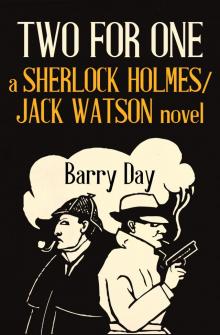 Two for One
Two for One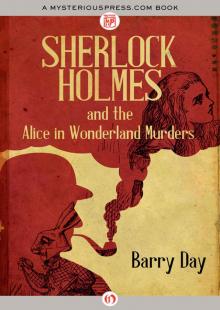 Sherlock Holmes and the Alice in Wonderland Murders
Sherlock Holmes and the Alice in Wonderland Murders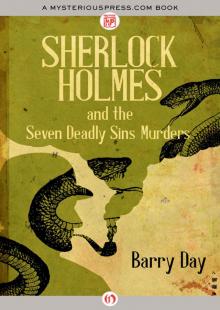 Sherlock Holmes and the Seven Deadly Sins Murders
Sherlock Holmes and the Seven Deadly Sins Murders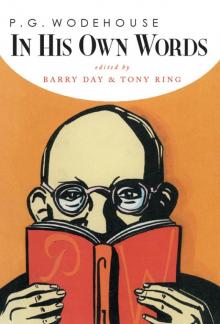 P.G. Wodehouse in his Own Words
P.G. Wodehouse in his Own Words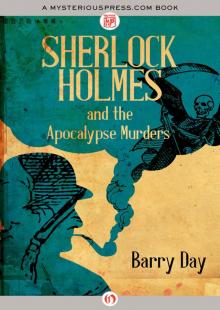 Sherlock Holmes and the Apocalypse Murders
Sherlock Holmes and the Apocalypse Murders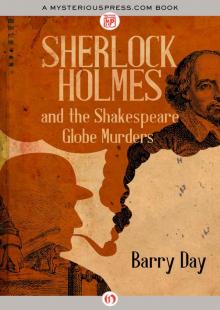 Sherlock Holmes and the Shakespeare Globe Murders
Sherlock Holmes and the Shakespeare Globe Murders